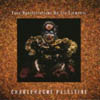 Some of Palestine's gorgeous drones are now transferred to CD and remastered by Lee Ranaldo and Thomas Koner for the Netherlands-based Barooni label. The two have done a great job too: the sound is crystal clear. This opens with 20 minutes of near static drones and tones in "Two-Fifths".
Some of Palestine's gorgeous drones are now transferred to CD and remastered by Lee Ranaldo and Thomas Koner for the Netherlands-based Barooni label. The two have done a great job too: the sound is crystal clear. This opens with 20 minutes of near static drones and tones in "Two-Fifths".
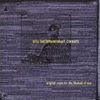 Finally Eric Bachmann releases an album under his own name. The former singer of Archers of Loaf and current mastermind behind Crooked Fingers composed "Short Careers," as the score for a finished, yet to be released, independent feature called "Ball of Wax." The film has a frightening, chilling story, and it seems Bachmann has set the mood just right. The music fits right in between Bachmann's arty leanings with his Barry Black recordings and the more somber balladry of Crooked Fingers. Violin, cello, upright bass, piano, and guitar intermingle playfully throughout, despite the ominous tones of the revealing track titles ("Aspirin vs Arsenic," "Nosebleed," "The Mysterious Death of Robert Tower"). Bachmann's music never really seemed all that cinematic, though his lyrics have always told stories that are longer than life, so it deems him a rather odd choice for film scoring, particularly since that means there will be little in the vocal department. Add to that the fact that the movie is about major league baseball, and it sounds like a disaster waiting to happen. Luckily, the film was completed when Bachmann composed and recorded the score, so he had great freedom and inspiration—more than some composers get. The music is quirky enough while still serving a purpose, though not as much when heard on its own. It will probably have more meaning after the listener views the film, but on its own only a few tracks are truly stand-alone works ("Vision and Execution," "Ty Cobb," "Good Morning Sleepyhead"). This album is proof positive, however, that the former leader of a popular indie college rock band can score movies, and I'm sure he'll get more work for it in the future.
Finally Eric Bachmann releases an album under his own name. The former singer of Archers of Loaf and current mastermind behind Crooked Fingers composed "Short Careers," as the score for a finished, yet to be released, independent feature called "Ball of Wax." The film has a frightening, chilling story, and it seems Bachmann has set the mood just right. The music fits right in between Bachmann's arty leanings with his Barry Black recordings and the more somber balladry of Crooked Fingers. Violin, cello, upright bass, piano, and guitar intermingle playfully throughout, despite the ominous tones of the revealing track titles ("Aspirin vs Arsenic," "Nosebleed," "The Mysterious Death of Robert Tower"). Bachmann's music never really seemed all that cinematic, though his lyrics have always told stories that are longer than life, so it deems him a rather odd choice for film scoring, particularly since that means there will be little in the vocal department. Add to that the fact that the movie is about major league baseball, and it sounds like a disaster waiting to happen. Luckily, the film was completed when Bachmann composed and recorded the score, so he had great freedom and inspiration—more than some composers get. The music is quirky enough while still serving a purpose, though not as much when heard on its own. It will probably have more meaning after the listener views the film, but on its own only a few tracks are truly stand-alone works ("Vision and Execution," "Ty Cobb," "Good Morning Sleepyhead"). This album is proof positive, however, that the former leader of a popular indie college rock band can score movies, and I'm sure he'll get more work for it in the future.
samples:
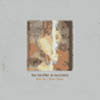 Take this album's title as a hint of what to expect. While watching a meteor shower and listening to music, the most exciting thing will, of course, be the meteor shower itself. Tara Jane and Dan are probably two of my favorite current singer/songwriters in the North American rock scene. I've seen both live on a number of occasions with their bands, Ida and Retsin, and once, just recently, in which each did fantastic solo performances. (Dan played on a number of instruments including a couple on harmonium and Tara Jane even did a Bruce Springsteen cover!) Needless to say, when I learned of the impending collaborative release, I was very excited. However, the two people whose voices and lyrics I cherish have ironically recorded an album of almost entirely instrumental songs— songs which disappointingly enough sound like they were explicitly built for vocals. With the exception of "Ooh la la..." (with French [?] vocals), there's a general void of any strong lead instrument. It almost makes me want to organize a letter-writing campaign for the duo to go back and record some lyrics on this record. This soundtrack for getting a midnight snack could easily bore the most sexually inactive vegan cafe patrons. Don't get me wrong, there's no love lost for these two, as they're each still incredible musicians and songwriters. However, if it's their signature sound that you've fallen in love with that you're anticipating, you'd be better off saving your money on this one.
Take this album's title as a hint of what to expect. While watching a meteor shower and listening to music, the most exciting thing will, of course, be the meteor shower itself. Tara Jane and Dan are probably two of my favorite current singer/songwriters in the North American rock scene. I've seen both live on a number of occasions with their bands, Ida and Retsin, and once, just recently, in which each did fantastic solo performances. (Dan played on a number of instruments including a couple on harmonium and Tara Jane even did a Bruce Springsteen cover!) Needless to say, when I learned of the impending collaborative release, I was very excited. However, the two people whose voices and lyrics I cherish have ironically recorded an album of almost entirely instrumental songs— songs which disappointingly enough sound like they were explicitly built for vocals. With the exception of "Ooh la la..." (with French [?] vocals), there's a general void of any strong lead instrument. It almost makes me want to organize a letter-writing campaign for the duo to go back and record some lyrics on this record. This soundtrack for getting a midnight snack could easily bore the most sexually inactive vegan cafe patrons. Don't get me wrong, there's no love lost for these two, as they're each still incredible musicians and songwriters. However, if it's their signature sound that you've fallen in love with that you're anticipating, you'd be better off saving your money on this one.
samples:
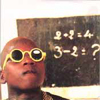 "Mali Music" is a collaboration between Blur's Damon Albarn and a groupof musicians from Mali, hence the title. A recent New York Times pieceabout the making of this album brought up the inevitable issue ofcultural piracy and whether Western artists can effectively play withAfrican musicians without somehow exploiting them or tainting thepurity of their music. I feel that setting strict boundaries like thatlimit the overall possibilities of musical creativity and to be honest,I wouldn't have bought an album called "Mali Music" if it didn't havethe added recognizable hook. And I'm glad I did buy it, for a number ofreasons. First of all, the music is really good and different from mostof the new stuff that I listen to; overall it has a much happier,organic feel to it than what's in my normal rotation. Also Albarn'sadditions help add texture, like the dubby bass he puts under the finaltrack, "Les Escrocs" and his minimal vocals throughout the album. Asidefrom his vocals in English on a couple tracks, mostly he stays out ofthe way and leaves it to the musicians from Mail to perform theirmusic. The Times article mentioned that he went to Mali armed only witha melodica in order to keep his role simple and unobtrusive. Hiscontributions are important though and help add a familiar structure tosongs that might otherwise become inaccessible. On the track "SunsetComing On" he expertly weaves his vocals into the instrumental withoutoverwhelming it. I enjoyed listening to the new (to me) instruments andfor most of the album they meshed well with the modern layers ofproduction underneath. Another thing that I liked about the album isthat the proceeds go to Oxfam, a hunger relief organization that helpedsponsor the collaboration. So even if you don't agree with my musicalassessment, at least you won't feel guilty about adding this CD to yourcollection.
"Mali Music" is a collaboration between Blur's Damon Albarn and a groupof musicians from Mali, hence the title. A recent New York Times pieceabout the making of this album brought up the inevitable issue ofcultural piracy and whether Western artists can effectively play withAfrican musicians without somehow exploiting them or tainting thepurity of their music. I feel that setting strict boundaries like thatlimit the overall possibilities of musical creativity and to be honest,I wouldn't have bought an album called "Mali Music" if it didn't havethe added recognizable hook. And I'm glad I did buy it, for a number ofreasons. First of all, the music is really good and different from mostof the new stuff that I listen to; overall it has a much happier,organic feel to it than what's in my normal rotation. Also Albarn'sadditions help add texture, like the dubby bass he puts under the finaltrack, "Les Escrocs" and his minimal vocals throughout the album. Asidefrom his vocals in English on a couple tracks, mostly he stays out ofthe way and leaves it to the musicians from Mail to perform theirmusic. The Times article mentioned that he went to Mali armed only witha melodica in order to keep his role simple and unobtrusive. Hiscontributions are important though and help add a familiar structure tosongs that might otherwise become inaccessible. On the track "SunsetComing On" he expertly weaves his vocals into the instrumental withoutoverwhelming it. I enjoyed listening to the new (to me) instruments andfor most of the album they meshed well with the modern layers ofproduction underneath. Another thing that I liked about the album isthat the proceeds go to Oxfam, a hunger relief organization that helpedsponsor the collaboration. So even if you don't agree with my musicalassessment, at least you won't feel guilty about adding this CD to yourcollection.
samples:
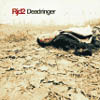 For some reason RJD2 is offended by comparisons to DJ Shadow. Iunderstand that DJs who make instrumental hip-hop don't want to beaccused of biting another DJ's style, but if two people have similarmusical interests and both create sample-based music, there is a goodchance that the result will sound similar. RJD2 favors organic drumbreaks and densely layered instrumental tracks, and does a good job ofvarying the flavor of his samples from song to song. If you have heardother Def Jux releases and can't quite get into the abrasive,synthesized, distortion-laden beats then this could be the one for you.
For some reason RJD2 is offended by comparisons to DJ Shadow. Iunderstand that DJs who make instrumental hip-hop don't want to beaccused of biting another DJ's style, but if two people have similarmusical interests and both create sample-based music, there is a goodchance that the result will sound similar. RJD2 favors organic drumbreaks and densely layered instrumental tracks, and does a good job ofvarying the flavor of his samples from song to song. If you have heardother Def Jux releases and can't quite get into the abrasive,synthesized, distortion-laden beats then this could be the one for you.The typical track on this album combines snippets of scratchy 70s soulvocals and instrumental samples like upright basslines to create asatisfyingly melodic whole. The album is somewhat of an antidote to theprogrammed, mechanical beats that have been dominating recent hip-hopDJ work. In other words, it's very un-Neptunes. Three of his trackshave MCs rhyming over them and each does a good job complimenting theDJ skills without overwhelming the complex instrumentals underneath.They also big up the DJs approach with lines like "RJ's thearchaeologist, diggin 'em up" . One of my favorite songs on the albumis "Ghostwriter," a perfect blending of layers of loops and vocals intoa head-nodding instrumental classic that never gets too repetitive. Ithink it was a great decision by Def Jux to pick up an artist likeRJD2, a talented DJ and master of the sampler who can produce musicthat offsets the label's darker tendencies...I guess he's not thatShadowy after all.
samples:
 P:ano started in 1999 in Vancouver as a collaboration between NickKrgovich and Larissa Loyva. Nick had been working on some songs whenthey started getting together to sing and play music, and they decidedto work on those songs by fleshing them out with more instruments.Later they added drummer Justin Kellam and Chris Harris, and the solidline-up was complete. "When It's Dark and It's Summer" is their debutrelease, recorded at Hive Studios and co-released on their new labelHive-Fi with Zum Media. As far as first works go, it's an incrediblyaccomplished batch of songs, with fully realized textures and melodies,that work towards a seemingly transcendent goal. This music is not justmeant to live in your ears for the short time you listen to it, it'sintended to invade the spaces behind. And it accomplishes that well,for the most part. P:ano's influences are clear, though anotherboy-girl dual vocal indie pop band to add to the mix could spell adisastrous future. However, the group also has enough originality uptheir sleeves to last. It's described as chamber pop, and that's prettyaccurate. The songs have classic pop structures, with hummable melodiesand understandable lyrics. They translate that simple structure withsparse arrangements that highlight the vocal power of the group.Krgovich and Loyva's voices blend well together with almost sickeninglysweet result, and the added flavors - strings, trumpet, clarinet - givethe songs that extra oomph. By the time you reach the penultimate track'Billions and Billions' (Carl Sagan reference, anyone?), whichstretches over seven-and-a-half minutes with an extended workout,you're hooked. A nice debut with real potential for the future.
P:ano started in 1999 in Vancouver as a collaboration between NickKrgovich and Larissa Loyva. Nick had been working on some songs whenthey started getting together to sing and play music, and they decidedto work on those songs by fleshing them out with more instruments.Later they added drummer Justin Kellam and Chris Harris, and the solidline-up was complete. "When It's Dark and It's Summer" is their debutrelease, recorded at Hive Studios and co-released on their new labelHive-Fi with Zum Media. As far as first works go, it's an incrediblyaccomplished batch of songs, with fully realized textures and melodies,that work towards a seemingly transcendent goal. This music is not justmeant to live in your ears for the short time you listen to it, it'sintended to invade the spaces behind. And it accomplishes that well,for the most part. P:ano's influences are clear, though anotherboy-girl dual vocal indie pop band to add to the mix could spell adisastrous future. However, the group also has enough originality uptheir sleeves to last. It's described as chamber pop, and that's prettyaccurate. The songs have classic pop structures, with hummable melodiesand understandable lyrics. They translate that simple structure withsparse arrangements that highlight the vocal power of the group.Krgovich and Loyva's voices blend well together with almost sickeninglysweet result, and the added flavors - strings, trumpet, clarinet - givethe songs that extra oomph. By the time you reach the penultimate track'Billions and Billions' (Carl Sagan reference, anyone?), whichstretches over seven-and-a-half minutes with an extended workout,you're hooked. A nice debut with real potential for the future.
samples:
 There's really a fine line between jazz-influenced electronic beats and sleepy nu-jazz telephone hold music and unfortunately, this album teeters a weee-bit too close to the undesirable.
There's really a fine line between jazz-influenced electronic beats and sleepy nu-jazz telephone hold music and unfortunately, this album teeters a weee-bit too close to the undesirable.
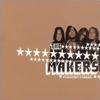 The Makers have been recording since 1993, and this album furtherexplores their recent glam-rock concept album tendencies. Listening toit sounds a lot like the soundtrack to 'Manhunter' or 'Band of theHand', or like the band is desperately trying to recreate the sound ofthat awful band in the club scenes of 'Lethal Weapon'. "StrangestParade" sounds like it wouldn't be out of place in 1985-1987, theheyday of big hair metal, but a time when just as many glam rock bandswere recording on a smaller scale than those that were successful. Theywere better than their big ticket major label counterparts. Lead singerMike Maker, or Michael Shelley, sounds like a bizarre cross of DannyElfman and Robert Smith, and the band is as full of angst as ever. Thealbum is sprinkled with segues in between the actual songs that tend todistract more than help. Bands trying to sound like the undergroundscenes of previous decades have merit, but only when they add somethingto the sound. The Makers try alright, but then the songs just aren'tall that compelling. Their last album, 'Rock Star God' was as much aconcept record as this one, but it seemed more polished and heartfelt."Parade" split into two parts, with one part seemingly moreintrospective and the other more balls to the wall. The phone ringingthat appears early on "Calling Elvis, John and Jesus" would be anoriginal thought if it hadn't been done 1800 times by other bands, orif the song was stronger; but the phone seems to plays a huge part inPart One of the record, as though a person were calling someone to helpthem or waiting by the phone for someone to call and save them. Thelyrics leave something to be desired, as well, as all good '80s hairbands' did ('Laughter then violence/music then silence'). Part Twoisn't as long as Part One, and it has some interesting textures, butbands like Cobra Verde just do this whole retro sound better,concetrating more on the essence in the songwriting than a seeminglyempty concept. This just doesn't grab me all that much.
The Makers have been recording since 1993, and this album furtherexplores their recent glam-rock concept album tendencies. Listening toit sounds a lot like the soundtrack to 'Manhunter' or 'Band of theHand', or like the band is desperately trying to recreate the sound ofthat awful band in the club scenes of 'Lethal Weapon'. "StrangestParade" sounds like it wouldn't be out of place in 1985-1987, theheyday of big hair metal, but a time when just as many glam rock bandswere recording on a smaller scale than those that were successful. Theywere better than their big ticket major label counterparts. Lead singerMike Maker, or Michael Shelley, sounds like a bizarre cross of DannyElfman and Robert Smith, and the band is as full of angst as ever. Thealbum is sprinkled with segues in between the actual songs that tend todistract more than help. Bands trying to sound like the undergroundscenes of previous decades have merit, but only when they add somethingto the sound. The Makers try alright, but then the songs just aren'tall that compelling. Their last album, 'Rock Star God' was as much aconcept record as this one, but it seemed more polished and heartfelt."Parade" split into two parts, with one part seemingly moreintrospective and the other more balls to the wall. The phone ringingthat appears early on "Calling Elvis, John and Jesus" would be anoriginal thought if it hadn't been done 1800 times by other bands, orif the song was stronger; but the phone seems to plays a huge part inPart One of the record, as though a person were calling someone to helpthem or waiting by the phone for someone to call and save them. Thelyrics leave something to be desired, as well, as all good '80s hairbands' did ('Laughter then violence/music then silence'). Part Twoisn't as long as Part One, and it has some interesting textures, butbands like Cobra Verde just do this whole retro sound better,concetrating more on the essence in the songwriting than a seeminglyempty concept. This just doesn't grab me all that much.
samples:
 It's hard to believe two years have passed since the incredible first 2xCD compilation from Morr Music surfaced (Putting the Morr Back in Morrissey). Two years later, a number of the bands featured have released marvelous albums on the Berlin-based Morr. This year's 2xCD collection of digital lullabies features a few acts who have become usual suspects from the Morr roster of champions as well as a handful of new faces: one disc of cover tunes, the other with all new material. Allegedly the story goes like this: Creation Records is dead and buried, Thomas Morr tried but failed to obtain the rights to reissue Slowdive's back catalogue, but that didn't stop him from successfully curating a fantastic collection of Slowdive cover tunes by a number of popular Morr artists and friends.
It's hard to believe two years have passed since the incredible first 2xCD compilation from Morr Music surfaced (Putting the Morr Back in Morrissey). Two years later, a number of the bands featured have released marvelous albums on the Berlin-based Morr. This year's 2xCD collection of digital lullabies features a few acts who have become usual suspects from the Morr roster of champions as well as a handful of new faces: one disc of cover tunes, the other with all new material. Allegedly the story goes like this: Creation Records is dead and buried, Thomas Morr tried but failed to obtain the rights to reissue Slowdive's back catalogue, but that didn't stop him from successfully curating a fantastic collection of Slowdive cover tunes by a number of popular Morr artists and friends.
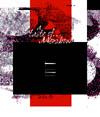 One cannot discuss a new Merzbow CD without mentioning how damn manyothers exist. No Merzbow CD can ever truly be "the new one", becausesome label is forever adding to the Merzbow publishing glut, newer onesarriving at a rate which confounds mere chronological hierarchy. It hasbecome so that the band name is like a brand name; one buys some moreMerzbow, rather than any specific album. Or one does not buy, which isincreasingly seeming like a fine idea. After all, it is not apparentthat Merzbow's Masami Akita actually has as many album-length ideas ashe does albums. Rather, he produces his sound until hismedia-determined time restraint runs out. I would be very surprised ifhe listens at all to what he produces these days, after or even duringthe process of recording, so satisfied he must be that he has filledanother 74 minutes with Merzbow.
One cannot discuss a new Merzbow CD without mentioning how damn manyothers exist. No Merzbow CD can ever truly be "the new one", becausesome label is forever adding to the Merzbow publishing glut, newer onesarriving at a rate which confounds mere chronological hierarchy. It hasbecome so that the band name is like a brand name; one buys some moreMerzbow, rather than any specific album. Or one does not buy, which isincreasingly seeming like a fine idea. After all, it is not apparentthat Merzbow's Masami Akita actually has as many album-length ideas ashe does albums. Rather, he produces his sound until hismedia-determined time restraint runs out. I would be very surprised ifhe listens at all to what he produces these days, after or even duringthe process of recording, so satisfied he must be that he has filledanother 74 minutes with Merzbow. Now, Mego is a label that I trust and respect. Not attached to anygenre or style, only a vague and loose allegiance to computer-createdmusic of some kind, I would expect them to demand more from Merzbow.That doesn't seem to be the case. On "A Taste of...", it sounds to meas if a couple of samples were looped for five minutes at a time, whilevarious filters were bloodlessly applied and removed. It's as if apattern, or perhaps an instruction booklet for some software, wasstrictly followed so that this specific result would emerge. There is atheme of Japanese cuisine presented in the artwork, but nothing withinthe music which resonates that theme. In fact, Japanese cuisine valuespresentation, freshness and detail, and this noise sounds as if no onemade it or was paying much attention to it or its ingredients at all.
I believe that noise can be musical—bands like Hijo Kaidan,Borbetomagus, Masonna, and especially CCCC, have produced works thathold up as albums which evidence some compositional thought andemotion, or even concentrated non-emotion. Pita has done so using acomputer; his "Get Out" is one of the most powerful computer-musicalbums that I can think of. Merzbow used to make albums that soundedwhole ("Antimonument", "Batz-Tau-Tai", "Material Action 2"), but sincethe 1990s has forfeited quality for quantity. If you've been wonderingwhy he is generally refered to as the "king" of Japanese noise music,you won't find out why by listening to "A Taste of...".
samples:



